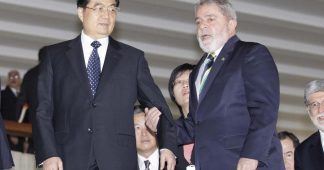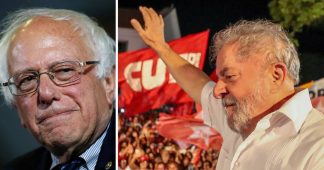Lula Talks to TIME About Ukraine, Bolsonaro, and Brazil’s Fragile Democracy
By Ciara Nugent
Brazil May 4, 2022
Read this story in Portuguese
Luiz Inácio Lula da Silva’s return to frontline politics was a bombshell for Brazil. In April 2021, the Brazilian Supreme Court annulled a series of corruption convictions that had excluded the leftist former President from national elections in 2018, saying a biased judge on his case had compromised his right to a fair trial. The decision set Brazil on course for a showdown between Lula—as he is universally known—and current far-right President Jair Bolsonaro in the October 2022 elections.
Lula, who officially launches his campaign on May 7, promises to bring Brazil back to the good old days of his 2003-2010 presidency, which he wrapped with an 83% approval rating. That would mean reviving an ailing economy, saving a threatened democracy, and healing a nation scarred by the world’s second-highest COVID-19 death toll and two years of chaotic pandemic mismanagement. So far, his promises are resonating: Lula is polling at 45% compared to Bolsonaro’s 31%. But the gap is narrowing.
TIME staff writer Ciara Nugent sat down with Lula in late March, in the São Paulo headquarters of his Workers’ Party (PT), to speak about his time in prison, the war in Ukraine, and whether his plans for the country are based on more than nostalgia. This transcript has been condensed and edited for clarity.
TIME: When the Supreme Court restored your political rights last year, you were already preparing for a quieter life away from politics, according to Brazilian media. Did you immediately decide to return?
In truth, I never gave up. Politics lives in every cell of my body, in my blood, in my head. Because the issue is not politics itself, but the cause that brings you to politics. And I have a cause.
When I left the presidency in 2010, I was not planning to be a presidential candidate again. But in the 12 years since I left office, I see that all the policies I created to benefit the poor—all our social inclusion policies, everything we did to improve universities, technical schools, improving salaries, improving the quality of jobs—all that was destroyed, dismantled. Because the people who started to occupy the government after the coup that took Dilma [Rousseff] out, were people who wanted to destroy all of the things that the Brazilian people had won after 1943.
There is an expectation that I would become President of Brazil, again, because people have good memories of the time when I was President. Because people had jobs. Because people had better wages, because they had wage increases above inflation. So I think people miss that, and they want those things improved.
Brazil is facing a very different situation today than when you won the presidency for the first time in 2002—in terms of the economy, political polarization, the international situation. Can you do as good a job as you did the first time?
In American football, there is a player. As it happens he’s ended up with a Brazilian woman. A model. And he’s been the best player in the world for a long time. In each game he’s going to play, his fans demand that he plays better than he did in the last one. With the presidency it’s the same thing. I am only running because I can do better than I did before.
I’m sure that I can resolve [Brazil’s] problems. I’m certain that our problems will only be solved when poor people are participating actively in the economy, when poor people participate in the budget, when poor people are working, when poor people can eat. That is only possible if you have a government that is dedicated to the poor.
Continue reading at time.com
We remind our readers that publication of articles on our site does not mean that we agree with what is written. Our policy is to publish anything which we consider of interest, so as to assist our readers in forming their opinions. Sometimes we even publish articles with which we totally disagree, since we believe it is important for our readers to be informed on as wide a spectrum of views as possible.










